Mutulese Army: Difference between revisions
Arthurista (talk | contribs) m (→Mobile reserve) |
Arthurista (talk | contribs) |
||
| (8 intermediate revisions by the same user not shown) | |||
| Line 52: | Line 52: | ||
===Regional forces=== | ===Regional forces=== | ||
Each Military Region is home to an infantry division, with one mechanised infantry, two regular light infantry and two reserve light infantry brigades. Each brigade consists of a HQ company, three rifle battalions, an artillery battalion, and a support battalion with a reconnaissance company, an engineer company, an air-defence company and a logistics company. The mechanised brigades are equipped with the {{wp|VBTP-MR Guarani|VBTP}} combat vehicles (gradually replacing the older {{wp|EE-11 Urutu|EE-11}}. The light infantry brigades are usually well-trained in jungle or mountain warfare, depending on its native environment. All infantry and mechanised brigades possess a company of {{wp|EE-9 Cascavel|EE-9}} armoured cars for reconaissance and fire support purposes. | Each Military Region is home to an infantry division, with one mechanised infantry, two regular light infantry and two reserve light infantry brigades. | ||
Each brigade consists of a HQ company, three rifle battalions, an artillery battalion (18x 155mm howitzers in three batteries), and a support battalion with a reconnaissance company, an engineer company, an air-defence company and a logistics company. The mechanised brigades are equipped with the {{wp|VBTP-MR Guarani|VBTP}} combat vehicles (gradually replacing the older {{wp|EE-11 Urutu|EE-11}}. The light infantry brigades are usually well-trained in jungle or mountain warfare, depending on its native environment. All infantry and mechanised brigades possess a company of {{wp|EE-9 Cascavel|EE-9}} armoured cars for reconaissance and fire support purposes. | |||
In addition, each military region has at its disposal two independent tank battalions, a rocket artillery group, an anti-air command, a helicopter group, an engineer brigade and a logistics command. | In addition, each military region has at its disposal two independent tank battalions, a rocket artillery group, an anti-air command, a helicopter group, an engineer brigade and a logistics command. | ||
| Line 66: | Line 68: | ||
The second is the ''Ik'ak Tzuk'' ("ఇఖక జుకు", "Fire Wind Brigade"). Its organisation is similar to those of the regional infantry units. However, the brigade’s personnel are trained in parachuting and air assault operations. It is primarily intended to play a rapid reaction ‘fire brigade’ role to deal with internal contingencies, or in the alternative support the [[Royal Mutulese Marine Corps]] in an offensive operation. | The second is the ''Ik'ak Tzuk'' ("ఇఖక జుకు", "Fire Wind Brigade"). Its organisation is similar to those of the regional infantry units. However, the brigade’s personnel are trained in parachuting and air assault operations. It is primarily intended to play a rapid reaction ‘fire brigade’ role to deal with internal contingencies, or in the alternative support the [[Royal Mutulese Marine Corps]] in an offensive operation. | ||
The final formation is a special forces brigade known as the ''Taj Tzuk'' ("తహ జుకు", "Obsidian Brigade"). Consisting of three battalions of commandos, it is highly skilled in unconventional warfare, counter-terrorism special reconnaissance and direct action missions. | The final formation is a special forces brigade known as the ''Taj Tzuk'' ("తహ జుకు", "Obsidian Brigade"). Consisting of three battalions of commandos, it is highly skilled in unconventional warfare, counter-terrorism, special reconnaissance and direct action missions. | ||
==Small unit organisation== | ==Small unit organisation== | ||
| Line 74: | Line 76: | ||
Rifle companies are divided into a headquarters element, three rifle platoons, an anti-tank team (with three PF-98 recoilless rifles) and a grenade launcher team (with three {{wp|QLZ-87 grenade launcher|Type-87}} automatic grenade launchers). | Rifle companies are divided into a headquarters element, three rifle platoons, an anti-tank team (with three PF-98 recoilless rifles) and a grenade launcher team (with three {{wp|QLZ-87 grenade launcher|Type-87}} automatic grenade launchers). | ||
Each rifle platoon consists 30-men in total, divided into three squads. The squads, each commanded by an NCO serving as squad leader, consist of two fireteams of four men | Each rifle platoon consists 30-men in total, divided into three squads. The squads, each commanded by an NCO serving as squad leader, consist of two fireteams of four men. One of these is centred around a light machine gun, the other around an RPG-7. The platoon is commanded by a junior commissioned officer, supported by a platoon sergeant and a radio operator. | ||
The battalion's support company contains its main heavy weapons assets. Typically, it possesses a mortar platoon with eight 120mm smoothbore mortars, an ATGM platoon with twelve anti-tank missile launch posts, as well as a scout/sniper team. | The battalion's support company contains its main heavy weapons assets. Typically, it possesses a mortar platoon with eight 120mm smoothbore mortars, an ATGM platoon with twelve anti-tank missile launch posts, as well as a scout/sniper team. | ||
| Line 138: | Line 140: | ||
| 7.62×51mm | | 7.62×51mm | ||
| | | | ||
|----- | |||
|- style="background:#efefef; color:black" | |||
| {{wp|AMR-2}} | |||
| [[File:Amr-2 sniper.png|125px]] | |||
| {{flag|Elatia}} | |||
| Anti-materiel rifle | |||
| 12.7x108mm | |||
| | |||
|----- | |----- | ||
|- style="background:#efefef; color:black" | |- style="background:#efefef; color:black" | ||
| Line 268: | Line 278: | ||
| {{flag|Mutul}} | | {{flag|Mutul}} | ||
|Amphibious infantry Fighting Vehicle | |Amphibious infantry Fighting Vehicle | ||
|Primarily used by the Mutulese | |Primarily used by the [[Royal Mutulese Marine Corps]] | ||
|----- | |----- | ||
|{{wp|Type 63A}} | |{{wp|Type 63A}} | ||
| Line 274: | Line 284: | ||
| {{flag|Mutul}} | | {{flag|Mutul}} | ||
|Amphibious light tank | |Amphibious light tank | ||
|Primarily used by the Mutulese | |Primarily used by the [[Royal Mutulese Marine Corps]] | ||
|----- | |----- | ||
|{{wp|Type 74}} | |{{wp|Type 74}} | ||
| Line 300: | Line 310: | ||
| One company of fourteen per brigade. Primarily used as a reconnaissance vehicle and for infantry close fire support. | | One company of fourteen per brigade. Primarily used as a reconnaissance vehicle and for infantry close fire support. | ||
|----- | |----- | ||
| | |{{wp|Mitsubishi Type 89 IFV|Type 89}} | ||
|[[File: | |[[File:JGSDF IFV Type 89 20121021-01.JPG|125px]] | ||
| {{flag| | | {{flag|Tsurushima}} | ||
| Infantry Fighting Vehicle | | Infantry Fighting Vehicle | ||
| 400x utilised by the Royal Guards Armoured Division as infantry carriers. | | 400x utilised by the Royal Guards Armoured Division as infantry carriers. | ||
| Line 369: | Line 379: | ||
| {{flag|Mutul}}/{{flag|Sante Reze}} | | {{flag|Mutul}}/{{flag|Sante Reze}} | ||
| MLRS | | MLRS | ||
| | | Five battalions, one per Military Region plus two in reserve | ||
|----- | |----- | ||
|} | |} | ||
| Line 473: | Line 483: | ||
|} | |} | ||
=== | === Surface-to-surface missile systems === | ||
{| class="wikitable" | {| class="wikitable" | ||
|- style="background:#aabccc;" | |- style="background:#aabccc;" | ||
| Line 482: | Line 492: | ||
! '''Numbers''' | ! '''Numbers''' | ||
|----- | |----- | ||
|{{Wp|DF-26}} | |{{Wp|DF-26|G-26}} | ||
|[[File:Dong-Feng 26.JPG|125px]] | |[[File:Dong-Feng 26.JPG|125px]] | ||
| {{flag| | | {{flag|Mutul}} | ||
| Mobile IRBM | | Mobile IRBM | ||
| | | | ||
|----- | |----- | ||
|{{Wp|DF-21}} | |{{Wp|DF-21|G-21}} | ||
|[[File:DF-21A TEL - Chinese Military Museum Beijing.jpg|125px]] | |[[File:DF-21A TEL - Chinese Military Museum Beijing.jpg|125px]] | ||
| {{flag| | | {{flag|Mutul}} | ||
| Mobile MRBM | | Mobile MRBM | ||
| | | | ||
Latest revision as of 01:38, 12 June 2024
| Mutulese Army | |
|---|---|
| File:Capture2.PNG Logo of the Mutulese Army | |
| Founded | Reform of 1860 |
| Country | |
| Allegiance | Divine Kingdom |
| Type | Army |
| Size | 90,000 |
The Mutulese Army (Mutli: "ముతుల కబ లకమజులు", "Mutul Kab Lakamtzul") is the land combat arm of the Mutulese Armed Forces, alongside the Royal Mutulese Navy, Mutulese Air Force and the Royal Mutulese Marine Corps. As of 2018, it is a professional army staffed with 90,000 long-service personnel.
Organisation
Mutul is fortunate in having no hostile neighbours sharing a continguous land border. Accordingly, the Mutulese Army is configured primarily for general territorial defence, whilst the 30,000-strong Marine Corps undertake the main strategic offensive role. It is organised around three Military Regions – Peninsular, North East and South West, as well as a Mobile Reserve.
Regional forces
Each Military Region is home to an infantry division, with one mechanised infantry, two regular light infantry and two reserve light infantry brigades.
Each brigade consists of a HQ company, three rifle battalions, an artillery battalion (18x 155mm howitzers in three batteries), and a support battalion with a reconnaissance company, an engineer company, an air-defence company and a logistics company. The mechanised brigades are equipped with the VBTP combat vehicles (gradually replacing the older EE-11. The light infantry brigades are usually well-trained in jungle or mountain warfare, depending on its native environment. All infantry and mechanised brigades possess a company of EE-9 armoured cars for reconaissance and fire support purposes.
In addition, each military region has at its disposal two independent tank battalions, a rocket artillery group, an anti-air command, a helicopter group, an engineer brigade and a logistics command.
Each Infantry Brigade consists of approximately 4,000 personnel, with the entire Military Region disposing of some 30,000 troops upon full mobilisation.
Mobile reserve
The mobile reserve, stationed near the capital city, consists of three units.
The largest of these is the K'uhul Tupilob Tzul ("ఖుకౢ తుపిలిభొ జులు", "Divine Guards Division") . This is the only division-sized formation in the Mutulese Army configured for large-scale tank operations. It consists of three armoured brigades, each with two tank and two mechanised infantry battalions, an artillery battalion, and a support battalion with a reconnaissance company, an engineer company, an air defence company, a logistics company and a maintenance company. The full strength of this unit is 15,000 personnel.
The second is the Ik'ak Tzuk ("ఇఖక జుకు", "Fire Wind Brigade"). Its organisation is similar to those of the regional infantry units. However, the brigade’s personnel are trained in parachuting and air assault operations. It is primarily intended to play a rapid reaction ‘fire brigade’ role to deal with internal contingencies, or in the alternative support the Royal Mutulese Marine Corps in an offensive operation.
The final formation is a special forces brigade known as the Taj Tzuk ("తహ జుకు", "Obsidian Brigade"). Consisting of three battalions of commandos, it is highly skilled in unconventional warfare, counter-terrorism, special reconnaissance and direct action missions.
Small unit organisation
A Mutulese infantry battalion consists of a headquarters, three rifle companies and a support company. Its total strength is roughly 700 personnel.
Rifle companies are divided into a headquarters element, three rifle platoons, an anti-tank team (with three PF-98 recoilless rifles) and a grenade launcher team (with three Type-87 automatic grenade launchers).
Each rifle platoon consists 30-men in total, divided into three squads. The squads, each commanded by an NCO serving as squad leader, consist of two fireteams of four men. One of these is centred around a light machine gun, the other around an RPG-7. The platoon is commanded by a junior commissioned officer, supported by a platoon sergeant and a radio operator.
The battalion's support company contains its main heavy weapons assets. Typically, it possesses a mortar platoon with eight 120mm smoothbore mortars, an ATGM platoon with twelve anti-tank missile launch posts, as well as a scout/sniper team.
Equipment
Small arms
| Name | Image | Origin | Type | Cartridge | Details |
|---|---|---|---|---|---|
| Thunder 9 | 
|
Pistol | 9×19mm | ||
| MP74 | 
|
Sub-machinegun | 9×19mm | ||
| Type-83 | Assault rifle | 5.56x45 | To be relegated to reserve | ||
| FX-05 | Assault rifle | 5.56x45 | Gradually being introduced as main service weapon | ||
| HP9-1 | File:Hp-91.png | Shotgun | 12 Gauge Shotgun | ||
| T93 sniper rifle | 
|
Sniper rile | 7.62×51mm | ||
| AMR-2 | 
|
Anti-materiel rifle | 12.7x108mm | ||
| Ultimax 100 | 
|
Light machine gun | 5.56x45 | ||
| NTK-62 | 
|
Medium Machine gun | 7.62×51mm | ||
| W85 heavy machine gun | 
|
Heavy machine gun | 12.7×108mm |
Grenade-based weapons
| Name | Image | Origin | Type | Details |
|---|---|---|---|---|
| M75 hand grenade | 
|
Grenade | ||
| Type 06 rifle grenade | 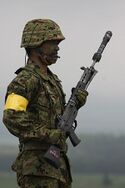
|
Rifle grenade | ||
| Q-87 | 
|
Automatic grenade launcher | 35mm |
Anti-tank weapons
| Name | Image | Origin | Type | Details |
|---|---|---|---|---|
| RPG-7 | 
|
Various | Shoulder-launched anti-tank weapon | Upgraded to use the PG-7VR tandem-warhead |
| MARA (anti-tank weapon) | 
|
Disposable shoulder-launched anti-tank weapon | ||
| Type 79 Jyu-MAT | 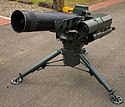
|
Anti-tank guided missile | Largely replaced in high-readiness units. Still used by reserve forces. | |
| Type 01 LMAT | 
|
Anti-tank guided missile | Replaced Type-79 in high-readiness units | |
| PF-98 | 
|
Anti-tank recoilless-gun | Main medium-range anti-tank weapon of infantry forces | |
| Model 1968 recoilless gun | 
|
Anti-tank recoilless-gun | Mainly in storage | |
| ALAS | 
|
NLOS loitering missile |
Combat vehicles
| Name | Image | Origin | Type | Numbers |
|---|---|---|---|---|
| EE-T1 | 
|
Main battle tank | 600 | |
| Type 05 amphibious fighting vehicle | 
|
Amphibious infantry Fighting Vehicle | Primarily used by the Royal Mutulese Marine Corps | |
| Type 63A | 
|
Amphibious light tank | Primarily used by the Royal Mutulese Marine Corps | |
| Type 74 | 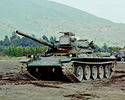
|
Main Batle Tank | Obsolete, replaced by the EE-T1, mostly used for training purposes and in storage | |
| VBTP | 
|
Armoured personnel carrier | ||
| EE-11 | 
|
Armoured personnel carrier | Being shifted to storage, replaced by the VBTP | |
| EE-9 | 
|
Armoured car | One company of fourteen per brigade. Primarily used as a reconnaissance vehicle and for infantry close fire support. | |
| Type 89 | 
|
Infantry Fighting Vehicle | 400x utilised by the Royal Guards Armoured Division as infantry carriers. | |
| Bronco All Terrain Tracked Carrier | 
|
Articulated tracked vehicle | 100+ | |
| UR-53 | 
|
General utility vehicle | Replaced the LC-49 in 2004 |
Artillery
| Name | Image | Origin | Type | Numbers |
|---|---|---|---|---|
| Mortar 60mm M57 | 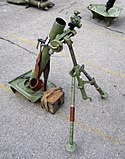
|
60mm mortar | ||
| 120mm M2 RAIADO | 
|
120mm mortar | Main battalion-level fire support weapon | |
| SLWH Pegasus | 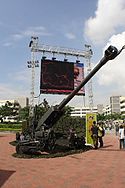
|
Template:Country data Lion’s Rock | 155mm howitzer | 18 utilised by the Airborne Brigade |
| Type-01 | 
|
155mm towed howitzer | Main artillery weapon of the Infantry Brigades | |
| Type-77 | 
|
155mm towed howitzer | Former main artillery weapon of the Infantry Brigades, currently mostly in reserve | |
| Type 75 155 mm self-propelled howitzer | 
|
155mm Self-propelled howitzer | 54x, in service with the Royal Guards Division | |
| Astros II MLRS | 
|
MLRS | Five battalions, one per Military Region plus two in reserve |
Air Defence Weapons
| Name | Image | Origin | Type | Numbers |
|---|---|---|---|---|
| Flak-23 | 
|
23mm | ||
| Type 91 surface-to-air missile | 
|
MANPAD | Main air-defence weapon of light infantry brigade groups | |
| Type 93 surface-to-air missile | 
|
SHRAD | Main air-defence weapon of mechanised brigade groups | |
| Type 03 Chū-SAM | 
|
SAM system | Main medium-range air defence system for military regions (i.e. division-level) | |
| Huraqan missile | 
|
SAM system | Long range SAM system used to defend key strategic targets. Block 2: SARH, 150km. Block 3: ARH, 200km. |
Army Aviation
| Name | Image | Origin | Type | Numbers |
|---|---|---|---|---|
| W-3 | 
|
Light transport/utility helicopter | ||
| Mil Mi-17 | 
|
Medium lift helicopter | ||
| Mi-26 | 
|
Heavy-lift helicopter | ||
| Mi-24 | 
|
Attack helicopter | ||
| U-96 | 
|
Tactical drone | ||
| U-06 | 
|
Handheld drone | ||
| U17 | 
|
Quadcopter mini-drone | Common civilian-grade miniature UAV, purchased in bulk commercially 'off-the-shelf' | |
| U-19 | 
|
Kamikaze drone |
Surface-to-surface missile systems
| Name | Image | Origin | Type | Numbers |
|---|---|---|---|---|
| G-26 | 
|
Mobile IRBM | ||
| G-21 | 
|
Mobile MRBM | ||
| SS-21 Scarab | 
|
TBM | ||
| SS-26 Stone | 
|
SRBM | ||
| Type 88 Surface-to-Ship Missile | 
|
Short- to medium-range coastal defence missile system |